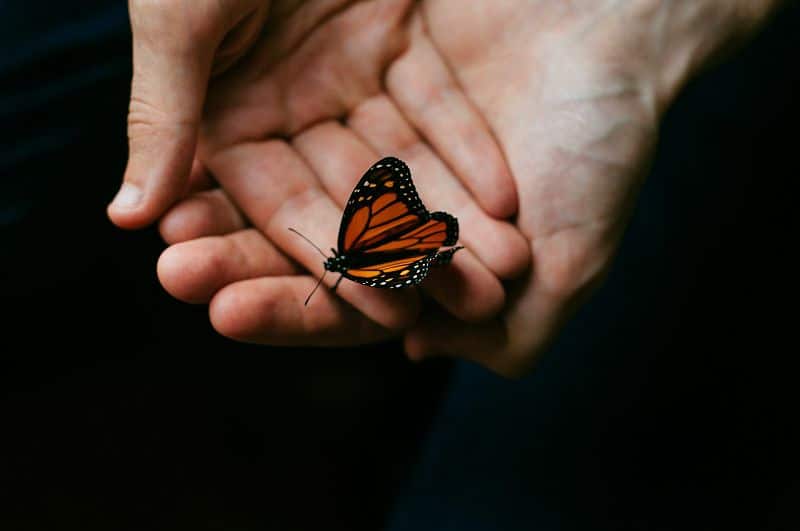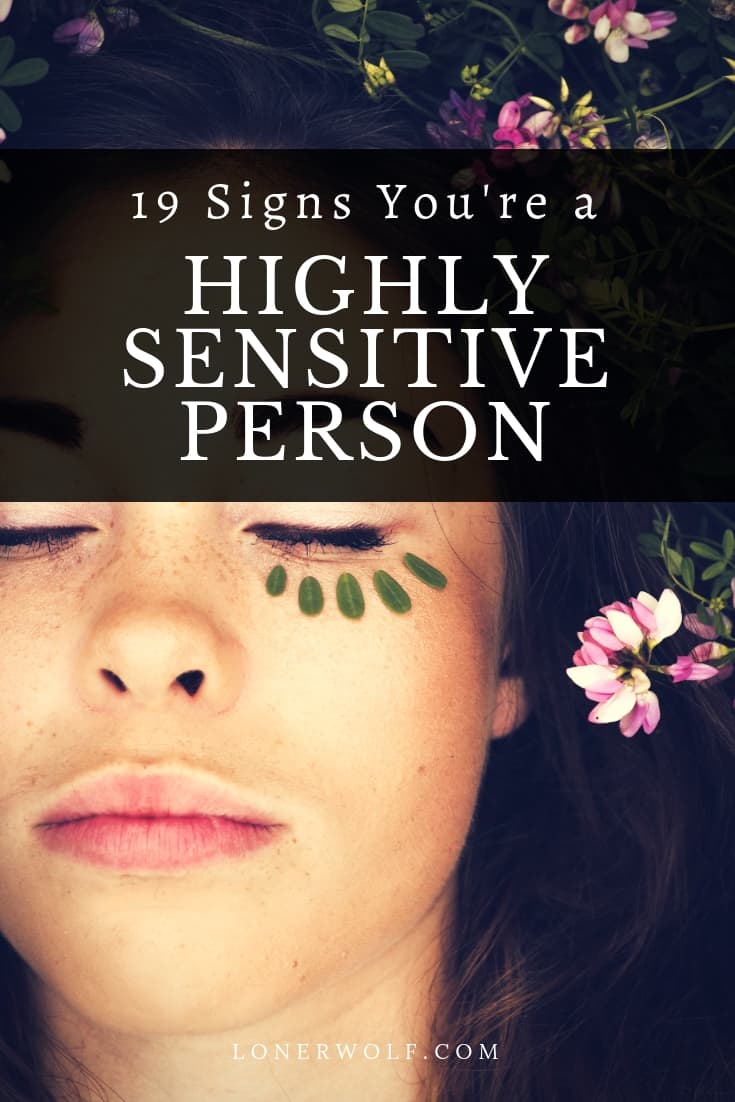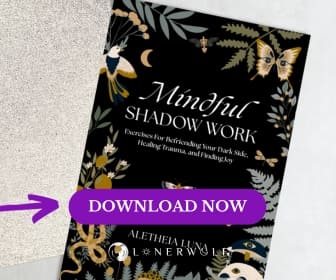It all added up. Sensitivity to loud sounds, harsh light, emotional climates, and over-stimulating situations? I’d just discovered something amazing: I’m a highly sensitive person.
For years, since childhood, I had always believed there was something terribly weird, different, strange, or broken about me.
New situations easily overwhelmed me. Strangers set me on edge. Loud sounds made me jump out of my skin. And even the slightest amount of coffee or alcohol sent me into a tailspin.
If you can relate to this level of sensitivity, you might be a highly sensitive person.
The life-changing reality of this label is that it helps you to accept that (1) you’re not crazy, (2) there’s nothing wrong with you, and (3) you’re not alone.
Table of contents
What is a Highly Sensitive Person?

Highly sensitive people (HSPs) are individuals who are genetically predisposed to higher levels of mental, emotional, and physical sensitivity. It is speculated that around 15-20% of our population is wired differently and therefore experiences life in a much more intense way than the average person. HSPs differ from neurotypical individuals in that they are more deeply impacted by sights, sounds, smells, tastes tactile sensations, and emotions.
19 Signs You’re a Highly Sensitive Person

Mother of the discovery, Elaine Aron, has been researching the highly sensitive person for over 20 years now. As such, she has a finely tuned list of traits and behavioral quirks that define the highly sensitive person. I’ve refined some of these traits below. See how many you can relate to:
- I’m aware of subtleties and nuances in different environments, e.g., a tap dripping too loudly, a light bulb burning too brightly, etc.
- I’m easily overwhelmed by the senses. Loud noises, strong smells, tastes, and light affect me negatively, e.g., the pounding music of nightclubs, loud busy freeways, and strong perfumes.
- I need to withdraw from busy days and take a break, or a nap, by myself.
- I’m overly sensitive to pain, e.g. needles, sports injuries, insect stings, etc.
- I become spooked and startled easily.
- I like to take my time, and not overload myself with too many activities as it drains and overwhelms me.
- I prefer to avoid violent TV shows and movies.
- I find it hard to adapt to changes in my life.
- I tend to ruminate and process information deeply.
- I’m empathic. I’m aware of the way people feel around me, and when any slight change occurs in them.
- Emotional environments tend to affect me deeply.
- I’m often perceived as being introverted or shy.
- I’m profoundly moved by nature, the arts or music.
- I tend to be more philosophically and spiritually-orientated.
- I feel unusually strong emotions.
- I avoid and deeply dislike confrontation of any kind.
- I prefer to not be observed when fulfilling tasks: it unsettles me.
- I tend to avoid situations that are too intense or chaotic.
- I seem to process the world at a very deep level.
How many of these qualities did you say “yes” to? I’d love to hear in the comments!
HSPs, Emotional Intensity, and Giftedness

Perhaps one of the defining qualities of being an HSP is how emotionally intense we are.
We feel everything in an intense, passionate, and sometimes devastating way. This intensity often leads us to become artists, visionary leaders, innovators, mentors, healers, and therapists.
But this is a bittersweet trait we share because while it helps us to live life with passion and intensity, it can also isolate us. We may be misunderstood, criticized, underpaid, undervalued, taken for granted, alienated, and generally perceived as being “too much.” We may be classified as neurotic, melodramatic, thin-skinned, or generally finicky – and mistreated because of it.
Yet, despite the many challenges we face, our intensity and giftedness as highly sensitive people also opens the doorway to potentially transcendent and cosmic adventures. For example, many people who are highly sensitive undergo spiritual awakenings and various mystical experiences. Because we are naturally sensitive and more in-tune with the undercurrents of life, we often find ourselves having paradigm-shifting insights about the nature of reality.
In fact, many highly sensitive people are also naturally gifted empaths and old souls who gravitate toward various spiritual pursuits that explore the meaning of life and how to experience spiritual Oneness.
Regardless of whether you’re spiritually-inclined or not, you will have the insatiable need to live authentically and find your true purpose.
Common Myths About the Highly Sensitive Person

As with any neuroatypical group, HSPs deal with their fair share of misguided judgments. Here are the three most common misconceptions about HSPs:
Myth #1: HSPs are introverts
HSPs and introverts both reflect deeply and have rich inner worlds – but not all HSPs are introverted, and vice versa. In fact, as Aron points out, 30% of the total number of highly sensitive people are actually extroverted. It’s a smaller number, but it still shows that introversion does not always equate to being highly sensitive.
Myth #2: Being an HSP is just another word for being shy
Just like introverts, highly sensitive people are often mislabeled as being shy. Although the two share things in common – such as sensitivity to overwhelming social situations – they are not the same thing. While shyness is learned, being a highly sensitive person is not.
Myth #3: “HSP” is a mental disorder
For some, it can be easy to mistake the highly sensitive person as a sufferer of some strange mental condition. Although some HSPs possess separate mental illnesses, being sensitive does not automatically make someone mentally ill. Instead, sensitivity is a trait, a gift even, that some people possess and others don’t. Besides, what pathological mental disorder allows the sufferer to be endowed with such genuine joys as being more empathic, spiritually-orientated, and appreciating the details of life more fully?
How to Survive as an HSP

Due to their sensitive nature, highly sensitive people are prone to idealism and perfectionism. This often stems from deriving our self-worth from the opinion of others, and not valuing ourselves enough. (And the self-worth issues we often develop are due to not being appreciated or understood throughout life.)
Also, being a highly sensitive person can hit you hard if you’re a male. Being a thick-skinned logician is favored as the masculine ideal in the Western world, rather than the sensitive, emotional poet. But whatever difficulties we face as highly sensitive people can be overcome with the ability to reframe the negative into the positive, and actively work to better our environments. Here are some tips:
1. Learn to value yourself
I learned this the hard way. When we place too much importance on what people say and think about us, we create immense psychological tension and anxiety. We are living to satisfy the thousands of different perspectives of who we “should” be, rather than embracing what we are. In essence, we are creating the exact thing we try to avoid that is detrimental to us: too much internal pressure and chaos. So be nice to yourself. Learn to value your qualities and gifts. Realize that you’re the one and only master over yourself, and no one can have power over you unless you let them.
2. Don’t take things personally
This tip, mentioned by Don Miguel Ruiz in his well-known book The Four Agreements, is essential for mental and emotional happiness.
The highly sensitive person is prone to get hurt easily by other people and their words. Consequently, we frequently find ourselves on-edge in social situations, trying to finely tune our behavior to avoid conflict.
When we take the insults and the moods of other people personally, we blame ourselves. We think that somehow we’re responsible, even deserve their abuse, but we’re not and we don’t.
To overcome the dilemma of taking things personally, try looking beyond your feelings. Use your ability to analyze instead and think to yourself, “I wonder what type of pain this person is suffering to treat me that way?” For example, perhaps they had a really bad day? Perhaps they’re going through a divorce? Perhaps they got triggered? Perhaps they had bad sleep?
When we ask these “why?” questions, we go beyond the initial sting of being mistreated and realize that ultimately, how people treat us is a reflection of them, not us. As Don Miguel Ruiz says, “nothing other people do is because of you.“
3. Embrace solitude
Solitude is not loneliness, instead, it is a chosen form of being alone, rather than an imposed one. When we choose solitude and take mini-retreats from our stimulating days, we give ourselves the gift of re-cooperation. As highly sensitive people, we need to be in-tune with our minds and bodies and the warning signs of burnout, such as irritability and physical exhaustion. So take a bit of alone time to renew yourself.
4. Investigate, identify, and act upon your sensitivity triggers
Wouldn’t life be a whole lot easier if we managed to resourcefully alter or intelligently negotiate our way around the stresses and stimulations that come our way? Of course, we can’t plan everything, but for the stresses currently existing in our lives, we can work to plan ahead and alleviate the incoming tension.
As an HSP, I struggled with this, stoically putting up with the extreme anxiety I felt at work until I realized that it was weakening my health. No, I didn’t do something drastic like quit my job, but I did decide to plan ahead and practice self-hypnosis every time I had to go to work, to prepare myself for the day. I still do.
As an HSP, you may be suffering from the same problem I did: a self-sacrificial acceptance of your less-than-healthy response to a situation in life. If you find yourself daily frazzled, try identifying what makes you so stressed out and think about what you can do to actively make your life easier to live. Life wasn’t meant to be bared with gritted teeth.
5 Ways to Stop Emotional Snowballing as a Highly Sensitive Person

Your heart pounds, you begin to tremble, your chest constricts, pain shoots through your core, your mind blurs … and all this, simply as a response to a threat, insult or even a simple tone of voice.
Highly sensitive people frequently live life on the brink of emotional snowballing, a term I use to describe a situation where emotions get out of control and quickly become out of proportion to the situation at hand.
Just think of a small snowball rolling down a very steep hill – it becomes larger and larger and rolls faster and faster very quickly. For many highly sensitive people, this emotional turbulence is a fact of life.
But why? As Elaine Aron pointed out in her book The Highly Sensitive Person, “most of us are deeply affected by other people’s moods and emotions.” In fact, you could say that most highly sensitive people are simply excellent social chameleons to the emotional landscapes around them.
This can be good news if everything is peachy bliss, but many times, highly sensitive people find themselves absorbing the poisonous negativity around them. You could say that the highly sensitive person’s problem is taking things too personally. But it’s much more than that. The highly sensitive person is deeply affected by any highly stimulating situation, whether physical, mental and emotional.
In a sense, you could say they feel everything at a more extreme level than the non-HSP person. While this can make life a lot more profound for highly sensitive people, it can also make interpersonal relations very bitter indeed.
Below you will find four techniques I have found useful in preventing emotional snowballing. I’m a highly sensitive person myself and hope these will help quell the tidal waves of emotion when they roll your way:
1. Seek out a quiet, empty spot to cool down
As I mentioned before, highly sensitive people suffer a lot at the hands of hyper-arousing and stimulating situations. The best thing to do when you become aware of the symptoms of emotional stress is to remove yourself from the situation. Excuse yourself, or simply walk away from the person or people that are causing you harm and find a deserted, empty place.
I say deserted and empty because the least stimulating, the better. You need to make time to re-cooperate and soften the violent sensations inside of you. I find that the bathroom is usually the best place to go, especially when the lights are out and everything is muted and dim.
2. Focus on something that made you happy today
If nothing made you happy today, try the past week, or you could think about the best thing that ever happened to you. I find that focusing on something positive helps break the cycle of negative emotions that begin to quickly increase inside. It also helps to remind you that life wasn’t always as painful as it seems in the present moment, and helps give you perspective.
For over 12 years, we've poured our hearts into creating free content on this website. Unlike many platforms, we believe this guidance should be accessible to everyone. If this post empowered you in any way, please consider making a donation to keep us going. Any amount (one-time or ongoing) makes a huge difference.
If you have had a bad run-in with a specific person in particular, you can also try thinking of the last time you enjoyed being in their company. Did they make you laugh, did you share something nice together, were you excited to talk to them? This works especially well with family members and close friends who have upset you.
It’s good to remember that everyone has bad days once in a while, and they aren’t necessarily angry at you – in fact, usually, they aren’t. They are simply reacting to their own bad feelings and taking it out on you. Once again, this technique of focusing on a past positive experience works well after you’ve sought out a quiet and empty spot to re-cooperate.
3. Listen to, or watch something upbeat
The biggest mistake that I made as a highly sensitive person was to listen to melancholic, dark music when I felt emotionally strained. Although it’s nice to feel as though others can relate to the way you feel through their music, this is not always a healthy way to deal with emotional turmoil.
If you’re primarily an auditory learner like me, listening to happy music is one of the best ways to stop emotional snowballing. I know it’s cliche, but try listening to “Don’t Worry, Be Happy” by Bob McFerrin for starters! (It’s bound to make you smile!) If you’re primarily a visual learner however, the next best alternative is to watch a comedic movie that will allow you to relax and break out of the negative cycles of emotion. Have a list of comedy movies at hand, just so you don’t lose time frantically scavenging for one. (By the way, if you want to find out what kind of learner you are, take our Visual, Auditory, or Kinesthetic test.)
4. Ground and orient yourself to your surroundings
When you feel like you’re spiraling out of control (i.e., feeling overwhelmed, inundated, panicky, grief-stricken) find something beautiful, calming, or pleasant in your environment to focus on. This technique is often used in somatic psychotherapy for trauma sufferers and works wonders with highly sensitive people.
For example, you may choose to focus on a patch of sunlight on the ground, a vase of flowers in the distance, a child running and laughing, the calming color of the wallpaper, or anything else that brings you a burst of delight.
Orienting to something safe and pleasant in your environment is a powerful grounding technique that you can use anytime, anywhere.
5. Remember that this too will pass

This philosophic approach to preventing emotional snowballing for the highly sensitive person is a powerful way to transcend your emotional strife and look at life with a birds-eye perspective.
Think of everything good and bad that has ever happened to you. All of it has passed by and has been replaced with something different: the good with the bad, and the bad with the good.
Life is a constant flux; a wax and wane of good and bad. If everything was always good, we would find life boring and we’d take it for granted. In this way, the bad moments in our lives can even be seen as necessary and beneficial – they provide a contrast for the good so we can appreciate it even more fully.
So just remember: when you are close to an emotional snowball, remember that this too will pass. Like everything in your past, it will perish and be replaced with something else.
Are you a highly sensitive person? Do you have anything to add to this article? If so, please do below.
Also, you may like to take our Highly Sensitive Person (HSP) Test.










Hi colleagues, how is all, and what you desire to say concerning this post, in my view
its in fact awesome for me.
This is very very helpful. I recently found out that I am infact Highly Sensitive person, although I don’t hit all the signs but surely most of them. Specially about being easily stressed, I honestly started to think I cant do a job, I quit one because I got so overwhelmed!… Can you share about how you practice self-Hypnosis??… I also read somewhere that starting the day early and hence slow may also help
If you actively suffer as a HSP, you would know none of those help you when you are actually in the situation. What we are looking for is help when we are in a conversation, usually serious, with a person we are close to and we’re triggered. Usually tears come every time, but coping skills for the “in the moment” triggers, that would actually be helpful. You can’t just walk away when you’re in a confrontation with someone, be real.
Hello I have found your writing very relieving that the last 29 years and the strange epiphany I experinced (felt like the Entire world, was on my shoulders)are all due to the amount of people that actually care about me, I had to remember to keep myself upbeat that “the world is better with me in it”. I was an RN and felt very connected spiritually to the people i was caring for (in aged care), i found it easy to communicate easily with nearly the entire inhabitants. I am a drug user specifically Ice now and have been trying to leave to addiction behind however i feel that these people require me to use with them so they can feel less bad. I feel a huge amount of empathy for these people and others simply because the group i am with is misunderstood. particular views they have specifically about drugs and possible spiritual exploration (I used them for) were close to identical to my own. I am generally optimistic about my life and have enjoyed everything up to this point however I just feel that with the dawn of this new age and new consciousness for everyone is going… Read more »
Nice article, simple tips but it’s right that we should remember at those crazy moments…
One thing that makes me confused it’s about thinking good moments with a person who is making you feel hurt. Specially if there is love related, if somebody is making me crazy or hurting me, if I think positive moments with her, I become more emotional…what do you say about it?
I am truly thankful to the holder of this site who has shared this enormous piece of writing at here.
It’s so nice to know I am not the only over sensitive person out there. I cry at everything even if someone tells me positive things about myself.
I cry if someone criticises or shouts at me. And also feel emotional if it is someone else being criticised.
I really want to put something into practice. I try walking away and having time out in a quiet place but the thoughts are continually going round and round so can’t stop!
I’m nearly 40 and badly want to overcome the problem as it affects my career. So any extra tips would be great!
Earplugs. Earplugs are vital for surviving the chain stores, airports and anywhere they play that horrific American Idol-ish pop, too much audible stimuli of any sort. There are many types out there. Find what is comfortable and I’ve learned that with earplugs it actually does help to read the instructions.
Window tint on vehicle windows! It is amazing how much difference some tint makes when it comes to glare and heat. I relax about a million times over just by cutting the glare in my car.
Cool tips! Tnx! I recently got married, boy! So much more emotions to deal with. Didn’t know what an HSP was up until a week or two ago, and I definately tick all the boxes. Keeps a man humble… Unfortionately over reacting causes extra damage in this fragile new marriage, I have to learn quick :) Good to know that I’m not the only one out there. I’ve recently told my wife to let me go chill for a bit if I realise that my emotions are getting the better of me, this definately helps, as you said in point 1.